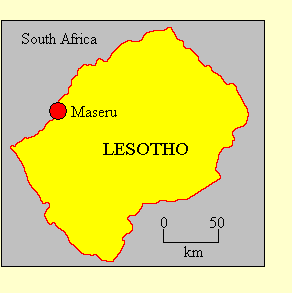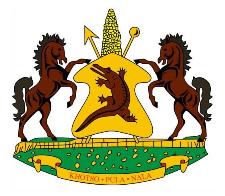

KINGDOM OF LESOTHO
• Official name: Kingdom of Lesotho
• Location: Southern Africa
• International organisations: African, Caribbean and Pacific Group of States, African Union,
Commonwealth of Nations, Non-Aligned Movement, United Nations, World Trade Organisation
• Borders: South Africa
• Coastline: None
• Land area: 30,355 Km2
• Population: 2,100,000
• Annual GDP (PPP) per capita: US$1,700 (2009 CIA estimate). World ranking: 158
• Ethnicity: Almost the entire population are Africans of the Sotho ethnic group. There are small minorities of
Europeans and Indians.
• Languages: English is the official language. Most of the population speaks SeSotho.
• Religion: About 80% of the population are Christians of various denominations. The remainder follow
indigenous beliefs.
• Form of government: parliamentary democracy and constitutional monarchy. Lesotho is divided into ten districts.
• Capital: Maseru
• Constitution: The
Constitution of Lesotho came into effect on 2 April 1993.
• Head of state: King Letsie III came to the throne
on 7 February 1996.
• Head of government: The Prime Minister, appointed by the King. The
Prime Minister is the leader of the largest party in the legislature and is accountable to it.
• Legislature: Lesotho has a bicameral legislature, the Parliament. The
National Assembly has 120 members,
80 elected fromn single-member constituencies and 40 elected by proportional vote for five-year terms. The
Senate has 33 members nominated for five-year terms
by the King, of whom 22 are hereditary chiefs.
• Electoral authority: The Independent Election Commission administers national
elections.
• Freedom House 2009 rating: Political Rights 2, Civil Liberties 3
Political history
The Kingdom of Lesotho (pronounced "Le-soo-too") was formed in 1818 from the Sotho-speaking lands by King Moshoeshoe I,
but he was unable to protect most of his lands from the encroachments by white settlers. Soon only the most mountainous and
inaccessible lands remained, and these became the British protectorate of Basutoland in 1868. In 1871 the
territory was handed over to the Cape Colony, but in 1884 it was restored to direct British rule. When the Union of
South Africa was formed in 1910, it agitated for Basutoland, Swaziland and Bechuanaland (Botswana) to be transferred
to South Africa, but Britain refused, unwilling to see the peoples of these territories subjected to white rule.

In 1965 Basutoland gained internal autonomy, and in October 1966 it became fully independent. Being entirely
surrounded by South Africa, the Kingdom remained poor and isolated, and South Africa exercised a dominant influence
over its politics. After disputed elections in 1970, Prime Minister Leabua Jonathan established an authoritarian
regime with South African backing, and retained power until 1986, when he was deposed in a military coup. The military ruler
Justin Lekhanya also deposed King Moshoeshoe II.
In 1991 Lekhanya was overthrown in another coup, and the new regime
brought the king back, and in 1993 allowed a return to constitutional government. Since then Lesotho, greatly
assisted by the end of white rule in South Africa, has been a fairly stable democracy. Although many more Sotho live
in South Africa than in Lesotho, there seems to be no support for abandoning Lesotho's independence. The dominant
parties in Lesotho is the Lesotho Congress for Democracy (LCD). The LCD leader and the Basotho National Party. The
LCD leader Pakalitha Mosisili has been Prime Minister since May 1998.
At the 2007 election the LCD won a comfortable majority. The main opposition parties are the National Independent Party (NIP),
the All Basotho Convention (ABC) and the Lesotho Workers Party (LWP).
Freedom House's 2009 report on Lesotho
says: "Lesotho is an electoral democracy... The February 2007 polls, originally set for May, left a shortened, 90-day timetable
that resulted in hasty preparations by the Independent Electoral Commission (IEC). Nevertheless, the elections were declared
free and fair by domestic and international observers... The government has aggressively prosecuted corruption cases. In recent years,
over a dozen officials and international construction firms have been investigated—and a number of both convicted—for bribery and
other crimes... Lesotho was ranked 92 out of 180 countries surveyed in Transparency International's 2008 Corruption Perceptions Index...
The government generally respects freedom of speech and the press, though press freedom has declined in recent years...
Freedoms of assembly and association are generally respected... Courts are nominally independent, but higher courts are especially
subject to outside influence."
Updated March 2010
|

